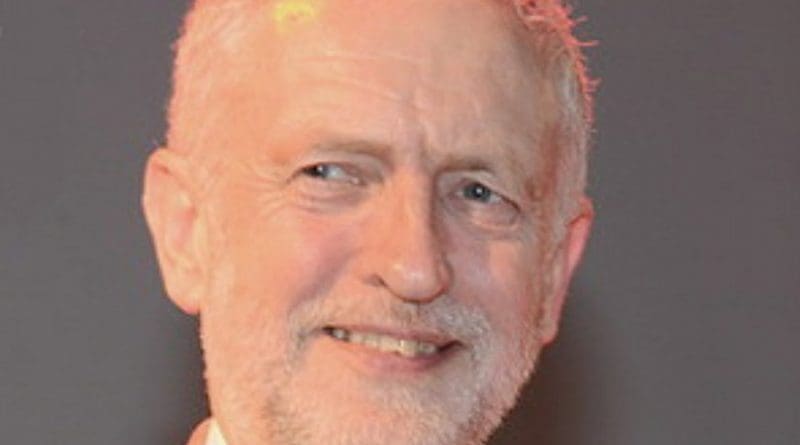UK: Corbyn Confounding Expectations – Analysis
By EurActiv
By James Crisp
(EurActiv) — Theresa May will win the British election but, unlike her, Jeremy Corbyn could emerge from the campaign with his reputation enhanced and his grip on the Labour party strengthened.
Ever since his shock election as Labour party leader in 2015, Corbyn has been derided as an unelectable hard-left relic intent on dragging Britain back to the 1970s.
But, standing on a pro-Brexit socialist manifesto that demands the nationalisation of mail, rail and energy firms, the bearded socialist has cut deeper and deeper into the mammoth Conservative lead.
One poll today had the gap between Labour and the Tories narrowed to a single point. Okay, recent UK history has shown polls are not to be trusted.
But many Brits, even if they disagree with him, believe that in Corbyn they finally have a politician brave enough to say what he really thinks and stand by his principles.
The media is treating him as a genuine contender for the first time. It is in their interest to do so. A real race makes a far better story than a Tory procession to power.
Corbyn has been aided by a shambolic Conservative campaign and such low expectations that even the hugely cautious Theresa May risked a snap election.
Yet the thrice married 68-year-old, who once holidayed in communist East Germany, has form when it comes to upsetting expectations.
He never expected to be leader of the Labour party. Neither did the unsuspecting centrist MPs who got him on the ballot paper.
A year later, after his risible effort for Remain in the Brexit referendum, 172 of his own MPs tried to oust him with a vote of no confidence. Corbyn won the leadership contest again, with an increased vote share.
On paper and in theory, he is electoral cyanide. He is accused of being an IRA sympathiser, which he denies, and famously invited Hamas to the House of Commons.
A lifelong outsider, he rebelled against his own party over the war in Iraq and supports sharing power with Argentina over the Falklands.
Unlike May, he won’t cap on immigration numbers. A former vice-president of the Campaign for Nuclear Disarmament, his critics warn he cannot be trusted with Britain’s nuclear deterrent.
He is tetchy with journalists, gaffe-prone, and rhapsodises at length about his allotment.
But, during the election, he has also shown himself to be a highly effective campaigner. His rallies attract fervent support.
He won plaudits for handling tough interviews with confidence and style, as well as – bizarrely – for eating a crisp.
Even if Corbyn-mania evaporates in the cold reality of the ballot box on Thursday, he deserves credit for managing to, even temporarily, shift the mood music.
The pro-EU Liberal Democrats, in contrast, deserve nothing but scorn and contempt.
They have managed to take the potential support of 48% of British voters who backed Remain and turn it into almost total political irrelevance.
The Roundup
Two days before Britain goes to the ballot box, Theresa May’s opponents are upping the pressure over her record as home secretary. They say terror is the legacy of deep cuts to policing since 2010.
This Tory candidate’s campaign video might just be the strangest and shabbiest ever made.
Donald Trump launched a Twitter tirade against London Mayor Sadiq Kahn following Saturday’s terrorist attack, while Emmanuel Macron and Jean-Claude Juncker expressed their sympathy.
Commissioner Maros Sefcovic told EURACTIV he has high hopes for global climate action, despite Trump’s withdrawal from the Paris Agreement, and EU officials say green finance is reaching a “tipping point” that could see climate-friendly investments become the norm.
Berlin’s diplomatic spat with Ankara entered a new phase yesterday, as Germany said it would withdraw its troops from Turkey’s Incirlik air base. German MPs have repeatedly been denied access to the base.
Russia responded angrily to Montenegro’s NATO accession on Monday and thousands of Slovaks took to the streets, calling for the resignation of the interior minister over corruption charges.
Saudi Arabia and five other Middle Eastern countries have cut all ties with Qatar, which they accuse of sewing instability in the region. The EU has promised €50 million to fight extremism in Africa’s Sahel region.
Italy is staring down the barrel of a snap election after MPs approved reforms to the country’s electoral law.
The International Trade Union Confederation has warned against public-private ‘blending’ in development aid, saying it is too open to bias and hard to assess.
Samuel White contributed to this Brief.

